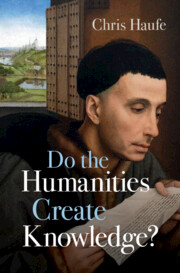Book contents
- Do the Humanities Create Knowledge?
- Do the Humanities Create Knowledge?
- Copyright page
- Dedication
- Epigraph
- Contents
- Preface
- Acknowledgments
- Chapter 1 Introduction
- Chapter 2 What Would the Community Think?
- Chapter 3 Canon and Consensus
- Chapter 4 Knowing What Matters
- Chapter 5 In Defense of How Things Seem
- Chapter 6 Reading What Lies Within
- Chapter 7 Humanities Victorious?
- Chapter 8 Of Interest
- Chapter 9 The Hoax and the Humanities
- Chapter 10 Conclusion
- References
- Index
Chapter 4 - Knowing What Matters
Published online by Cambridge University Press: 10 November 2023
- Do the Humanities Create Knowledge?
- Do the Humanities Create Knowledge?
- Copyright page
- Dedication
- Epigraph
- Contents
- Preface
- Acknowledgments
- Chapter 1 Introduction
- Chapter 2 What Would the Community Think?
- Chapter 3 Canon and Consensus
- Chapter 4 Knowing What Matters
- Chapter 5 In Defense of How Things Seem
- Chapter 6 Reading What Lies Within
- Chapter 7 Humanities Victorious?
- Chapter 8 Of Interest
- Chapter 9 The Hoax and the Humanities
- Chapter 10 Conclusion
- References
- Index
Summary
We learn about what matters from exemplars. But we learn more from exemplars than we can be taught, and we know more about them than we can say. The challenge of articulating that knowledge is what drives scholarly inquiry forward. Our epistemological mythology confuses those efforts to express that knowledge propositionally with the knowledge itself. Propositional representations of our knowledge are the currency of scholarly debate; there is no alternative. These representations attempt to distill clusters of salient features that we perceive an exemplar as exemplifying, features that seem to us to matter most for our understanding of the relevant phenomenon. The more precisely we can render these features, the more they stand out and demand our attention. As we endeavor to produce ever finer-grained articulations, we inadvertently exclude other features, features which themselves might eventually emerge as salient and which thus call for fundamental revisions in how we represent what we know.
- Type
- Chapter
- Information
- Do the Humanities Create Knowledge? , pp. 71 - 106Publisher: Cambridge University PressPrint publication year: 2023

